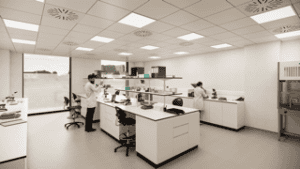
Scottish biotech secures initial orders for HIV diagnosis kit from Indonesia, Moldova and Papua New Guinea
pharmafile | March 7, 2019 | News story | Business Services, Medical Communications, Research and Development, Sales and Marketing | Diagnostics, HIV, Indonesia, Moldova, Scotland, developing coutnries
A small biotech based in Clackmannanshire, Scotland expects to turnover an additional £20 million from sales of its HIV diagnostics kit after the company secured initial orders from distributors in in Indonesia, Moldova and Papua New Guinea (PNG).
The Alva-headquartered company, which produces diagnostic tests for allergies and food intolerances, as well as HIV, has thus far relied on the revenue it generates from the allergy and intolerance arm of the business.
However the Scottish-firm has now secured initial orders for its Visitect CD4 350 diagnostic tests which give an indication of when CD4 cell counts in HIV patients fall to levels at which anti-retroviral drugs become a necessity.
Alongside orders from Indonesia, PNG and Moldova, the National Health Research Ethics Committee of Nigeria has approved the kit with the hope of selling the tests in the near future.
“Each country has a different way of managing HIV patients,” Mr King said. “In the western world, whenever someone is diagnosed they are immediately put on antiretroviral drugs, but ours is a point-of-care test that is designed for rural areas in the developing world.”
“The 350 test is used as a device to prioritise the administration of drugs – if the cell count falls below 350 cells per cubic millilitre that would be a trigger point.”
“Patients below a level of 200 cells per cubic millilitre have a very weak immune system and have a high risk of contracting other diseases, such as tuberculosis, and it is those diseases that will typically kill them rather than HIV,” Mr King explained. “It’s been found that if you’re taking antiretroviral treatment when your immune system is so low it’s not so effective. It’s better to take patients off the antiviral drugs, treat the other disease, and once that is treated put them back onto the HIV drugs and they will have a better chance of survival.”
Louis Goss
Related Content

InnotiveDx gets £1m grant to advance UTI diagnostics system
InnotiveDx has announced that it has received a £1m grant from Pathways to Antimicrobial Clinical …

University of Birmingham scientists develop new MRI contrast agent
Researchers at the University of Birmingham, UK, have developed a new class of magnetic resonance …

Chemify relocates to Glasgow’s new Health Innovation Hub
The company will be one of the first tenants in the city’s flagship life sciences …






